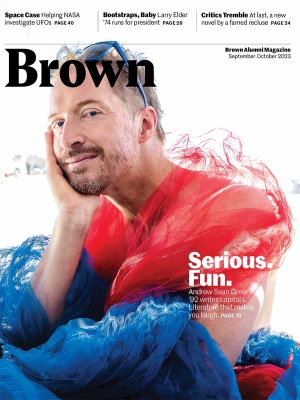Affirmative Reaction
A letter from the Editor
“I hadn’t really thought about going to college, till a young Black recruiter from Brown showed up,” Tony Puryear ’78 wrote in a Facebook post opposing the June 29 Supreme Court decision ending race-conscious admissions policies. “Now I’m out here ruling,” said Puryear, the first Black screenwriter to pen a $100-million summer blockbuster (Eraser). He credits the special treatment he got as a Black applicant with opening doors that otherwise would have been shut.
Meanwhile, presidential candidate Larry Elder ’74 (see story page 28) strongly opposes all forms of race-based affirmative action as doing more harm than good, though he’s said in the past he has personally benefited from it.
From the 1978 Bakke decision till June 29, race-conscious policies aimed at enriching the educational environment were legal; policies to create equitable educational opportunity were not. But race-conscious admissions had both effects, and testimonials on the latter one have often crossed my desk.
As an undergrad, Mursal Gardezi ’18 figured out how to get test results for bacterial infection in just 35 minutes, as opposed to the then-standard two weeks. “Mursal is the real deal,” said Christopher Borne, director of the orthopedic trauma research center at Rhode Island Hospital, in our 2018 article on exceptional seniors. Her research, with the potential of revolutionizing treatment and preventing amputations, had been presented nationally.
One comment Gardezi made was particularly striking. “Without Catalyst,” she said—a pre-orientation program aimed at increasing representation of historically excluded groups in STEM—“I don’t know if I would have passed. It’s that drastic.”
Gardezi’s family, Afghani Muslims who’d fled the Taliban, were “sometimes homeless, not always having food” as they made their way to California, where her dad drove a cab. Her public school didn’t prepare her for Brown. “Yes, I did get here because of affirmative action,” she told us, “but at the end of my four years, look what I’ve done.”
Mursal said it the most bluntly, but I saw versions of the same story repeatedly in the seven years I helped put together our annual package on exceptional graduating students.
Some of the students of color who were part of BAM’s “exceptional” pools—nominated by department chairs, center directors, professors, and others—referred to programs that had helped them overcome the results of educational inequality.
Others, like Austin Martin ’17—creator, as an undergrad, of Rhymes with Reason, a hip-hop based vocabulary program—spoke of their own work toward racial equity. Martin said that as a Black kid who attended private school and had college-educated parents, he wanted to give others the kind of opportunities he’d enjoyed. “I’ve seen what happens with the absence of educational opportunity in my community, family, and friends,” he told us.
Did race-conscious admissions affect you personally? We’d like to hear your stories to help us plan future coverage of this issue.




